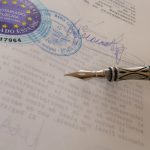Last updated on October 28th, 2019 at 05:17 pm.
A Power of Attorney in Spain, called a ‘Poder Notarial’ in Spanish, is a document by which you name a trusted person to represent you in certain transactions. For example, you might have someone to represent you to enable:
- purchase of a property
- sale of a property
- distribution of inheritance
- obtaining a Spanish NIE number
You grant your representative the power to act on your behalf. It is particularly useful if you are unable to come to Spain and have transactions that need to be completed here. Such a decision does require careful consideration and, obviously, you must feel sure that you are confident in whoever you delegate to.
Most importantly you need to ask yourself:
Who should I name to be my representative?
It might be obvious but, make sure you choose someone you trust. This might be a relative or a friend or a solicitor who you authorise to protect your legal interests.
Which powers should I grant?
A Spanish Power of Attorney can be as limited or as comprehensive as you wish. Your solicitor in Spain should help you make the decision about the extent of the power necessary for the transaction you wish to make.
Making a Spanish power of attorney
It is essential that you get a good Spanish solicitor to draft the document for you, using the correct terminology. They understand the Spanish legal system better than anyone and are the right people to do the job.
There are two ways of going about making the Power of Attorney:
In Spain – you will have to go to a Public Spanish Notary who is in a position to authorise the POA. The document will be written in Spanish so if you are not fluent yourself you will need someone to translate it.
In your own country – you might not be in a position to come to Spain to arrange the POA, however, you do have the alternative of making the arrangement in your own country. Your Spanish solicitor will draft the document in a bilingual version (your mother tongue and Spanish) so that the Notary in your own country cannot only witness you signing the document but also knows what it says. As in Spain, this is a very special function that cannot be completed by a solicitor nor a Commissioner for Oaths.
If you happen to live near the Spanish Embassy in your own country the POA can be made by the Notary Service there.
The Apostille of the Hague
The Apostille stamp is a document which is attached to the original to confirm that a signature, seal or stamp on that document is genuine. You need one to confirm the authenticity of any legal document issued in your own country. This might include a power of attorney, death/ marriage/ birth certificate. Without the Apostille of the Hague these documents will not be accepted by a Spanish Notary.
The international treaty called ‘The Hague Convention’ means that all countries who are part of the treaty have a standardised legalisation procedure – the Apostille. In Britain documents are apostilled by the Foreign and Commonwealth Office which is based in London.
Irish documents are apostilled by the Ministry of Foreign Affairs based in Dublin.
Sworn translations
All documents issued by a foreign authority to be used before a Spanish Public Notary or any other Public Authority must be translated by an official sworn translator. This is different from obtaining an ordinary translation which might be appropriate for private documents such as contracts, letters and receipts. A sworn translation is required for public documents and can only be completed by appointed qualified translators. The sworn translator becomes responsible for the contents of the document they have translated by signing and stamping it.
No comments yet
There are no comments on this post yet.






Leave a comment